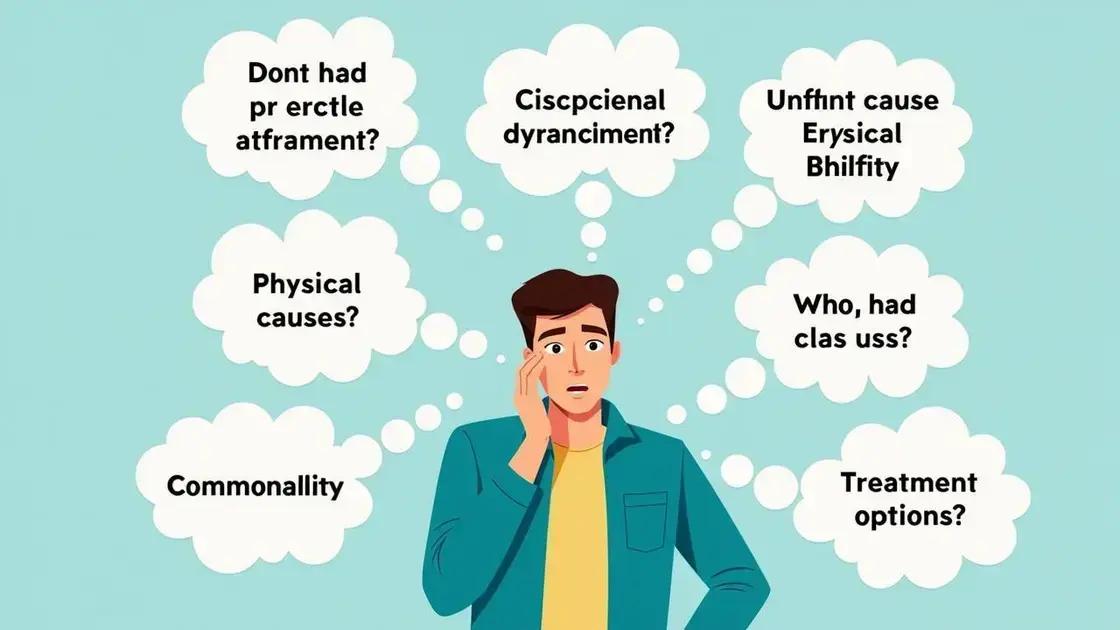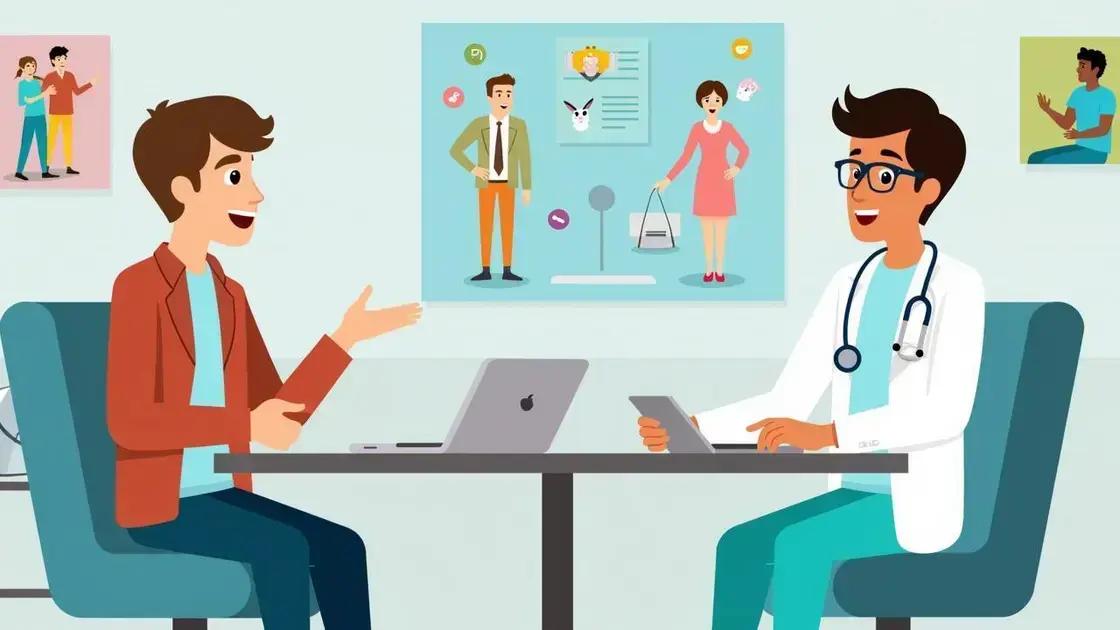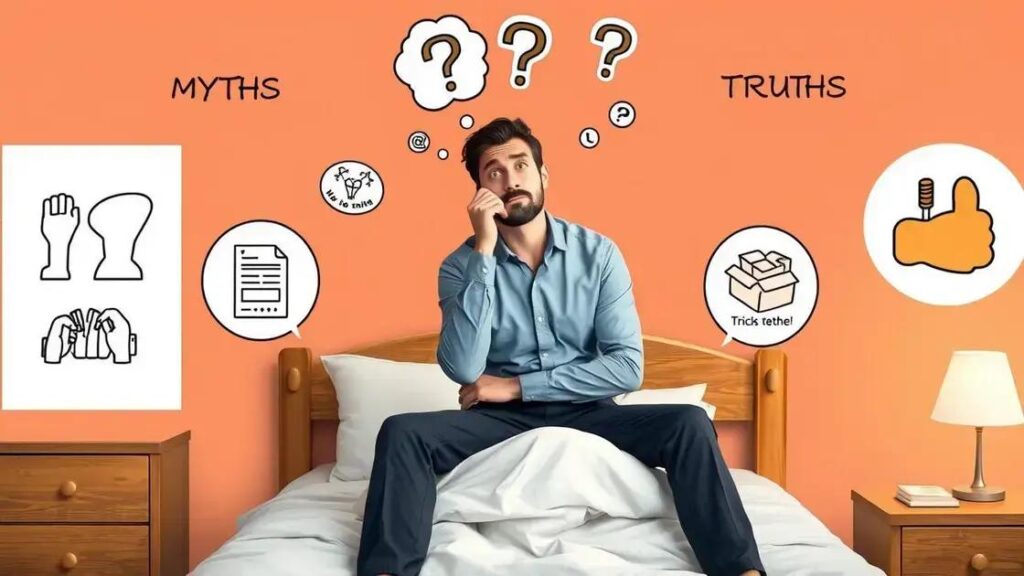Erectile dysfunction (ED) is a common condition affecting men of all ages, characterized by difficulty achieving or maintaining an erection. It can be caused by various factors, including physical health issues, psychological factors, and lifestyle choices. Treatment options include lifestyle changes, medications, and counseling, while enhancing communication with partners can support emotional well-being.
Erectile dysfunction (ED) is a condition that affects many men, yet it is often misunderstood. Common myths about erectile dysfunction can lead to stigma and misinformation. By debunking these myths, we can foster an accurate perspective on male health and intimacy. In this article, we will explore what erectile dysfunction truly is, clear up misconceptions, discuss its psychological impact, review treatment options, and highlight the importance of communication with partners.
Understanding Erectile Dysfunction

Erectile dysfunction (ED) is a condition that can affect men of all ages, although it becomes more common as men get older. Understanding erectile dysfunction is crucial in breaking the stigma surrounding it and recognizing that it is a medical issue that may require attention.
ED occurs when a man has difficulty achieving or maintaining an erection suitable for sexual intercourse. This can be caused by various factors, including physical conditions, psychological issues, and lifestyle choices.
Physical Causes of Erectile Dysfunction
Several health problems can contribute to erectile dysfunction. Conditions such as diabetes, high blood pressure, heart disease, and hormonal imbalances can hinder blood flow to the penis, making it challenging to achieve an erection.
Psychological Factors
Emotional and psychological factors, such as stress, anxiety, and depression, can also play a significant role in ED. Men may worry about their performance, leading to a cycle of anxiety that further inhibits their ability to attain an erection.
Lifestyle Choices
Certain lifestyle habits can increase the risk of erectile dysfunction. Smoking, excessive alcohol consumption, lack of physical activity, and an unhealthy diet can negatively impact sexual health.
Importance of Seeking Help
It is essential for men experiencing erectile dysfunction to seek help from a healthcare professional. This can lead to an accurate diagnosis and appropriate treatment options. By addressing the underlying causes, men can improve their sexual health and overall well-being.
Common Misconceptions

There are several common misconceptions about erectile dysfunction (ED) that can lead to confusion and stigma. It is important to set the record straight. Here are some widely held beliefs that are not true:
ED is Only a Problem for Older Men
One of the most prevalent misconceptions is that erectile dysfunction only affects older men. While it is more common in older age groups, younger men can also experience ED due to stress, anxiety, or health issues. It is not just an elderly problem.
ED Means a Man is Not Attracted to His Partner
Another myth is that if a man has erectile dysfunction, it means he is no longer attracted to his partner. This is false. ED can happen for various reasons unrelated to desire, including medical and psychological factors. It does not reflect a man’s feelings for his partner.
Only Physical Causes Lead to ED
Many believe that erectile dysfunction is solely caused by physical conditions. However, psychological factors such as stress, anxiety, and depression can significantly contribute to ED. The interplay between physical and mental health can be complex and requires understanding.
ED is Uncommon
Some people think that erectile dysfunction is rare. In actuality, it is quite common, affecting millions of men worldwide. Studies indicate that a significant percentage of men will experience some form of ED in their lifetime, making it important to discuss openly.
There is No Help for ED
Finally, a dangerous misconception is that nothing can be done about erectile dysfunction. This is simply false. There are various treatments available, including lifestyle changes, therapy, and medications. Encouraging men to seek help is crucial for addressing this condition.
The Psychological Impact

The psychological impact of erectile dysfunction (ED) can be significant for many men. Understanding these effects is crucial to address this condition holistically. Here are some key points about the psychological aspects of ED:
Feelings of Anxiety and Stress
Many men who experience erectile dysfunction may feel anxious about their performance. This anxiety can create a cycle, where the fear of not being able to perform leads to increased stress, which can further inhibit sexual function. Understanding that this is common can help alleviate some concerns.
Self-Esteem Issues
ED can impact a man’s self-esteem. Society often links masculinity to sexual performance, and many men may begin to feel less confident or inadequate. Addressing these feelings openly can be beneficial for mental health and relationships.
Impact on Relationships
The psychological effects of ED can extend to intimate relationships. Partners may also feel anxious or confused, leading to communication problems. It is important for both partners to engage in open discussions about these challenges to support each other better.
Fear of Diagnosis
Some men may fear seeking help due to the stigma surrounding erectile dysfunction. They might worry about being judged or labeled. Recognizing that ED is a medical condition can help men approach their healthcare provider without fear.
Exploring Psychological Therapy
Many men benefit from therapy when dealing with the psychological impacts of ED. Therapies like cognitive behavioral therapy (CBT) can help address anxiety and self-esteem issues, allowing men to regain confidence and improve their sexual health.
Treatment Options Available

There are several treatment options available for erectile dysfunction (ED), and understanding these can help men regain their confidence and improve their sexual health. Below are common treatments categorized based on their approach:
Lifestyle Changes
Making healthy lifestyle changes can significantly impact sexual health. Regular exercise, a balanced diet, quitting smoking, and reducing alcohol intake can all help improve erectile function. These adjustments promote better blood flow and overall well-being.
Medications
Several medications are commonly prescribed to treat ED. PDE5 inhibitors are the most popular. These include:
- Sildenafil (Viagra)
- Tadalafil (Cialis)
- Vardenafil (Levitra)
- Avanafil (Stendra)
These medications work by increasing blood flow to the penis, helping men achieve and maintain an erection. It is important to consult a healthcare provider to find the right option.
Counseling and Therapy
Since psychological factors often contribute to ED, counseling can be very effective. Physical and mental health are closely linked; thus, therapy can address underlying issues, such as anxiety or depression, and improve communication with partners, which can enhance intimacy.
Vacuum Erection Devices
Vacuum erection devices (VEDs) are non-invasive tools that can help create an erection. A device is placed over the penis, and a pump creates a vacuum that draws blood into the penis. A constriction band is used to maintain the erection. VEDs can be effective and do not involve medications.
Surgical Options
For men who do not respond to other treatments, surgical options may be considered. The most common procedures include:
- Penile implants
- Vascular surgery
Surgery often requires careful consideration and discussion with a healthcare provider about risks and benefits.
Enhancing Communication with Partners

Effective communication is essential when dealing with erectile dysfunction (ED) in a relationship. Enhancing communication with partners can help both individuals feel more connected and supported. Here are some strategies that can make a difference:
Start the Conversation
It’s important to have open and honest discussions about ED. Men may feel nervous, but approaching the topic can reduce anxiety. Choose a relaxed and private setting to talk. Using “I” statements can help express feelings without placing blame.
Be Supportive
Partners should focus on being understanding and reassuring. It’s essential to communicate that ED is a medical condition and not a reflection of their feelings towards each other. Showing mutual support can strengthen the relationship.
Share Feelings
Both partners should feel free to share their feelings about how ED affects them. Discussing fears, concerns, or frustrations can help both individuals understand each other better and foster empathy. Open dialogue can also uncover underlying issues that may contribute to the problem.
Discuss Treatment Options Together
Engaging in conversations about possible treatment options can help both partners feel more involved in the process. Explore potential solutions together, whether it’s lifestyle changes, therapy, or medical treatments. This can empower both individuals and help in decision-making.
Consider Professional Guidance
If communication becomes challenging, seeking help from a therapist can be beneficial. Couples therapy can provide a safe space to express feelings and learn strategies to communicate better. A professional can guide the couple through their emotional challenges related to ED.
Addressing Erectile Dysfunction Together
Understanding erectile dysfunction (ED) involves recognizing the myths and realities surrounding this common issue. By discussing the factors contributing to ED, from physical to psychological impacts, we can see that treatment options are available to help.
Enhancing communication with partners plays a vital role in managing the emotional aspects of ED. Open dialogue, mutual support, and exploring treatment together can strengthen relationships and reduce the stigma attached to this condition.
Ultimately, facing erectile dysfunction does not mean facing it alone. Encouragement to seek help and support from partners and professionals fosters a healthier attitude toward sexual health and well-being.
FAQ – Common Questions about Erectile Dysfunction
What is erectile dysfunction?
Erectile dysfunction (ED) is the inability to achieve or maintain an erection sufficient for satisfactory sexual performance. It can affect men of all ages.
What are the common causes of erectile dysfunction?
Common causes include medical conditions like diabetes and heart disease, psychological issues like anxiety and depression, and lifestyle factors such as smoking and excessive alcohol consumption.
Are erectile dysfunction and decreased sexual desire the same?
No, they are not the same. ED is about the physical ability to maintain an erection, while decreased sexual desire relates to libido and emotional factors.
How can lifestyle changes help with erectile dysfunction?
Lifestyle changes like regular exercise, a healthy diet, quitting smoking, and reducing alcohol can improve blood flow and overall health, potentially easing ED.
What treatments are available for erectile dysfunction?
Treatment options include lifestyle modifications, medications like PDE5 inhibitors, vacuum erection devices, counseling, and sometimes surgery.
How can couples improve communication regarding erectile dysfunction?
Open discussions, expressing feelings, and mutual support can help couples navigate the emotional aspects of ED and strengthen their relationship.












